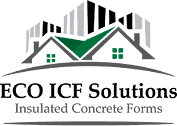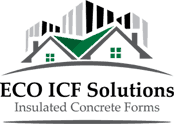Disaster-resistant Building Technology Helps Save Lives and Lower Insurance Costs
29 August 2003Ft. Lauderdale, Fla. – Flattened houses, overturned vehicles, wind and rain-ravaged neighborhoods. Every year, these images provide testament to the power of the elements and the inability of traditional “stick” construction to withstand its wrath.
Many builders, architects and engineers in disaster-prone regions are incorporating ECO-Block insulating concrete forms (ICFs) into their construction plans. This innovative building option dramatically increases structural performance during high winds, fire and earthquakes.
The possibility of lower insurance rates is also encouraging consumers to take such precautions and minimize losses related to disaster. The insurance industry has begun to offer substantial discounts to owners of homes and buildings made of ICFs, realizing that disaster resistant communities are in a better position to withstand catastrophic events.
ECO Block, LLC maintains a relationship with the Federal Emergency Management Agency (FEMA) and its Project Impact initiative. FEMA works to protect communities from the effects of disasters by offering a wide range of information to the public.
The agency publishes guides such as Taking Shelter from the Storm, Building a Safe Room Inside Your House and Design and Construction Guidance for Community Shelters. Both publications underscore the benefits of ICF construction and stand as a resource for community officials, builders and consumers.
Against the wind
Tests at Texas Tech University’s Wind Engineering Research Center show that wall construction makes a big difference. The high winds of hurricanes and tornadoes can send debris flying at a velocity so intense that wreckage can slice right through a building’s wall and endanger the people inside.
The tests demonstrate that ICF walls outperform their wood-and-steel counterparts by withstanding the impact of debris thrown by 250-mph winds. Lightweight steel and wood stud walls, however, offered little or no resistance. A 2″x4″ projectile ripped right through them.
“These test results make a compelling case for using ECO-Block,” says Ralph Evans, regional manager, ECO-Block. Evan’s territory includes hurricane-prone Florida. “Concrete walls provide the kind of structural integrity that can better shelter people from severe weather.”
Stirred, not shaken
While the western United States receives most of the nation’s earthquake activity, history tells us that catastrophic quakes could also strike in other parts of the country. Studies show that areas in the eastern United States, where buildings are not made to withstand earthquakes, face a much greater risk of devastation.
Structural designs that adhere to seismic codes are not a guarantee against collapse or serious damage. Earthquake victims can be seriously injured or killed when a building crumbles. To build structures that can withstand earthquakes, engineers choose materials that can hold up to that kind of movement.
“With the right design, buildings made of ECO-Block will fare better in an earthquake than a wood frame building that has not accounted for a seismic event,” says Sheldon Warman, P. Eng., technical director, ECO-Block.
Fighting the flames
Numerous firewall tests underscore the strength and fire resistance of ICF walls. Unlike wood, concrete does not burn. Unlike steel, it does not soften and bend. These tests subjected ECO-Block walls to continuous gas flames and temperatures of up to 2,000 degrees Fahrenheit for over four hours.
The tests also conclude that ECO-Block prevents flames from moving directly through its walls. By comparison, fire typically passes through wood-framed walls in an hour or less. Other tests indicate that in the event of a fire, no risk or hazards to the environment from toxic fumes are to be expected. The toxicity of the gaseous decomposition of ECO-Block’s flame retardant forms is comparable to that of wood-based materials.
Under cover
In this time of elevated security threats, ECO-Block offers increased shelter from terrorist bombings. Recent blast tests at Quantico Marine Corps Base demonstrate the structural integrity of ECO-Block during an explosion.
These tests were performed by the Insulating Concrete Form Association (ICFA) and sponsored by a host of government agencies, including both the Department of Defense and Transportation Security Administration.
ECO-Block was able to withstand 50 pounds of military-grade TNT at a distance of 26 feet. The compressive strength properties of the expanded polystyrene (EPS) on the face of each box both absorbed and distributed the impact during each explosion.
“The blast produced a fireball 200 feet wide and 100 feet high with lateral forces 10 times the box’s weight of 26,000 pounds, yet the result was nothing more serious than a few small serviceability cracks on the face of the wall and some melting of the EPS,” says Warman. “No structural damage was evident.
“We already knew that our system provides superior insulating properties as well as protection against severe weather,” he says. “Seeing it withstand a powerful blast highlights yet another benefit of using ECO-Block ICFs.”
ECO-Block can be used for a full range of building projects, from residential safe rooms to an entire office complex. It consistently saves construction time and conserves energy resources to slash utility bills by as much as 50 percent. For information on building with insulating concrete forms, go online to http://www.eco-block.com.
For more information about the wall tests, contact the Portland Cement Association. A trade association based in Skokie, Illinois, the PCA provides research, education and public affairs work on behalf of its members: United States and Canadian companies.
ECO-Block LLC is one of the world’s most innovative and experienced providers of insulating concrete form (ICF) technology. The Florida-based company manufactures and supplies the most versatile and technologically advanced ICF systems available for both commercial and residential construction. ECO-Block offers a cost-effective building solution that cuts energy costs, which can result in monthly savings of up to 50% for building owners. Use of ECO-Block’s ICF technology creates super-insulated, monolithic concrete walls that save energy, keep noise out and improve air quality. The use of renewable resources in ECO-Block ICF systems reduces reliance on wood products, helping protect our threatened forests. ICF technology is rapidly integrating into mainstream commercial and residential construction. In 1998, 20,000 new homes benefited from ICFs. Industry projections for 2003 estimate that approximately 100,000 homes will take advantage of ICF technology.

